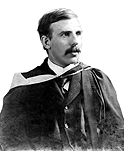Kaleidoscope
Norman Hoffman: An ear for students
 PHOTO: Owen Egan
PHOTO: Owen Egan |
|
Business is booming for Dr. Norman Hoffman and his staff and that's not a good thing.
Hoffman is the director of McGill Student Mental Health Services and he and his staff of six psychiatrists and one psychologist have been seeing a lot more patients of late.
"Eighteen years ago, we had visits from about 400 students a year," Hoffman says. "This year I think we'll end up seeing about 1,200."
So why the rocketing numbers? Hoffman attributes it to societal changes that leave today's students feeling more isolated than the generation that preceded them. Families tend to be more fragmented. Churches and synagogues don't play as powerful a role as they once did in promoting community bonds. The notion of community itself is seemingly on the wane.
"There has been a real breakdown in social support systems," Hoffman says.
The problems facing students haven't changed all that much over the years, but students increasingly feel that they have nowhere to turn when their lives get rocky.
They can, however, turn to Hoffman and his team.
The office for Mental Health Services is quietly perched on the top floor of the Brown Student Services Building's west wing. In Hoffman's own office, an old wood cabinet contributes to an overall atmosphere of coziness.
Hoffman says he doesn't lack for talented staff. The psychologist is a professor at Concordia and the psychiatrists, including Hoffman, tend to hold down academic appointments at McGill. They also come equipped with years of experience at Montreal's teaching hospitals. When a position opens up, Hoffman doesn't advertise. "We invite people to apply."
What's the draw?
"We get to do real psychiatry here," Hoffman explains.
"There's less and less of this sort of service available in the hospital system. The hospitals are focusing on more serious, long-term mental illnesses -- schizophrenia, severe manic depressive cases. That doesn't leave much room for people who are suffering with emotional difficulties."
From a psychiatrist's point of view, dealing with the sorts of patients who turn up at Mental Health Services can be especially rewarding.
"With more serious mental illnesses, often nothing much changes. You're trying to keep them stable.
"The students here are wonderful to work with. They're motivated. They're responsive. They're bright. They get better.
"Our main rule of thumb here is to give each patient what they need," says Hoffman. That also appeals to mental health specialists leery of quick fixes.
While most of its patients are short-term, the service is committed to treating its patients for as long as it's necessary. Hoffman worries that with all the publicity surrounding Prozac and other new medications for mental and emotional problems, "people want quick cures. Certainly, the drug companies and the media have contributed to that."
Hoffman says the drugs "aren't cure-alls." They don't work for everybody. And even when they do work, they aren't a substitute for patients taking the time to understand their emotions or making an effort to discover where their troubles stem from.
While some problems are relatively straightforward, others are tied to childhood traumas or deeply entrenched problems concerning self-worth that require careful attention.
Hoffman's original plan, when he was studying medicine at McGill, was to become a pediatrician. He liked the idea of dealing with young patients. But a residency in pediatrics changed his thinking.
"You didn't really have a chance to interact with kids because the kids were sick. You dealt with the parents."
It wasn't enough for Hoffman. He wanted to deal with patients in a more meaningful way. A subsequent residency in psychiatry, done under the watchful eye of psychiatry professor Joel Paris, resulted in Hoffman switching gears.
Paris headed Mental Health Services at the time and arranged for Hoffman to do a year-long residency with the unit. "I loved it," Hoffman says. Paris offered him a job.
Hoffman notes a disturbing new trend among some of his patients: students with mental problems are more apt to hurt themselves physically. "The incidence of self-injury has gone up. Some people are cutting themselves, burning themselves."
In general, "students today tend to feel more stressed about their future," says Hoffman. "They worry about getting a job and they worry about getting a high income in order to feel secure about the future." Hoffman suspects that, having grown up in an era of government cutbacks, students have concluded that they had better be able to look after themselves because they can't count on anybody else doing it.
 |
||||
|
There are many militants who have been there for 30 years, who are fighting the fights of the 1960s. The departure of Bouchard should set off a housecleaning. |
||||
Doctoral diagnoses
 |
|
According to a recent survey, the vast majority of American doctoral students are content in their studies; only three per cent say they wouldn't go to graduate school if they could do it all over again. Allthe same, they have plenty of criticisms of their universities.
"Although no more than half of the students will become faculty, and most of those will not find jobs at research universities, doctoral programs continue to train students to be research faculty," says University of Wisconsin-Madison researcher Chris Golde, who directed the survey of 4,114 doctoral students at 27 universities.
Golde says most PhD students view doctoral education as "unnecessarily mysterious." PhD candidates complain that universities do a poor job of explaining how the PhD process actually works.
One-third to two-thirds of students are unclear about the core processes of doctoral study, such as the applicability of their course work, how much time they will spend with their adviser, how their graduate studies and dissertation will be funded, and what criteria will determine whether they graduate.
Half to three-quarters of doctoral students say that they are not prepared for the various teaching and service activities that most faculty members spend the majority of their time doing. However, most say that they are confident in their ability to do research.
Universities are also panned for not doing enough in terms of informing doctoral students of non-academic job possibilities.
"A lot of departments unwittingly participate in making faculty [positions] look like the only option," Golde says. "Look at their literature. It says, 'Some of our more illustrious alumni are at Wisconsin, Harvard, Yale and Princeton.' Not, 'Of our last 30 graduates, here are the 30 things they are doing.'"
Adds Golde, "These findings demonstrate that it is critical to offer and encourage doctoral students to take opportunities to broaden their skills and consider careers outside of academia."
Sources: Wisconsin Week and The Chronicle of Higher Education
 |
||||
|
I'm not so sure that people know where their food comes from and how it was produced. In reality, there are very few foods in their natural state. You don't find Boston lettuce growing on the roadside or in the forest. |
||||
The importance of being Ernest
 |
|
"His picture appears on the $100 note, he was the first New Zealander to receive a Nobel Prize and he stands as one of the greatest scientists of all time, but many New Zealanders have no idea who he is."
That's from a recent article in The Southland Times, a New Zealand newspaper, about physicist Ernest Rutherford, whose pioneering work on the nature of radioactivity at McGill earned him a Nobel Prize. Rutherford went on to discover the atom's nucleus and paved the way for the nuclear age.
Rutherford's obscurity among his countrymen and women isn't likely to last long -- he is seemingly everywhere these days in the South Pacific country.
A play about his life was recently premiered and a new book accusing him of sexism has been strongly denounced by New Zealand scholars (Rutherford married the daughter of a suffragette and campaigned to get equal rights for women at Cambridge University, they counter).
Getting the most attention in the country, however, is a unique travelling exhibition making its way through New Zealand -- the National Science Technology Roadshow Trust's exhibition "Rutherford: the story of a kiwi genius."
Filling three galleries, the exhibition examines all aspects of Rutherford's life.
Huge panels covered with pictures and words explain his scientific work, his life, his place in history and other people's quotes about him, and interactive experiments encourage visitors to see the world through his eyes.
One of the items on display is the curriculm vitae handwritten by Rutherford when he applied for a job at McGill.
Large signs hanging from the ceiling caution visitors to "talk softly please," a regular feature in Rutherford's labs.
The playful physicist had a booming voice and loved to sing, especially "Onward Christian Soldiers," notes exhibition tour manager Steve Winter.
"He would come striding into a lab exuding life and upset delicate experiments."

